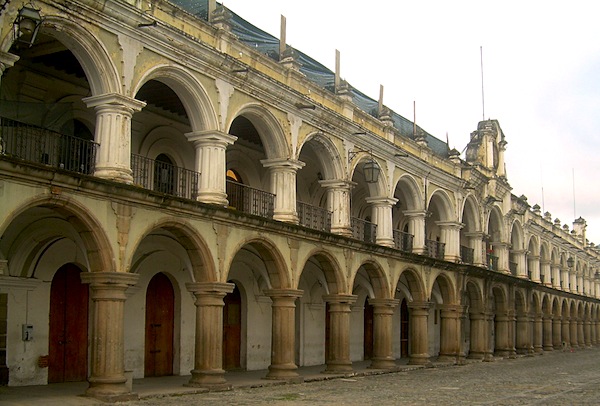

It’s not uncommon for news sites in the United States to evolve into a series of verticals: technology, politics, celebrity news, sports, and the like.
In Guatemala, Plaza Pública is also built around a series of verticals. But here, they’re equity, environment, social cohesion, cultural diversity, and corruption.
“We audit the private sector as part of our mandate,” site director Martín Rodríguez-Pellecer told me. “Traditional media does not cover these issues because they’re afraid companies would remove ads.”
Plaza Pública stands out for a few other reasons. It’s a digital native, but reluctant to set its pace against the 24-hour news cycle. It’s mainly funded by a private university, but it’s seeking a national audience.
The site’s name and concept were inspired by Jürgen Habermas’ idea of the public sphere, where private citizens come together to discuss matters of public relevance. Plaza Pública, which translates to “Public Square” in English, wants to be the place where such conversations not only take place (it has 80 blogs) but where they’re provoked by news stories.
In January, for example, it published an investigation that revealed minors were working on sugar plantations owned by the Guatemalan president’s Chamber of Agriculture. “In Guatemala, as in many other countries in Latin America, media orgs restrain the ‘public interest’ to public officials and public institutions, when it really goes beyond them,” Rodríguez-Pellecer said. “It also includes the links between businessmen and policy-makers, the media-politicians relations and controversial social issues.”
 Rodríguez-Pellecer says traditional media have ignored those dynamics. So when it comes to political coverage, Plaza Pública doesn’t just report how an elected official votes. The site also features data visualizations meant to help identify voting patterns between leaders, parties, and around certain topics.
Rodríguez-Pellecer says traditional media have ignored those dynamics. So when it comes to political coverage, Plaza Pública doesn’t just report how an elected official votes. The site also features data visualizations meant to help identify voting patterns between leaders, parties, and around certain topics.
Investigative data journalism is a big part of what Plaza Pública does, though its editors prefer to call it in-depth precision journalism. There’s a reason for that distinction: “During the past 20 years, any sensationalism is considered ‘investigative reporting.’ We try to do a less incendiary journalism,” Rodríguez-Pellecer said.
His team is a group of 15 reporters, coders, designers, and photojournalists. “We all have been in traditional media, but we got tired of not being able to do the journalism that we wanted,” said Rodríguez-Pellecer, who worked seven years as a reporter for Prensa Libre, Guatemala’s most influential newspaper. The newsroom also gets help from 10 students from different universities and in disciplines ranging from archeology to political science and journalism.
Two-thirds of Plaza Pública’s $300,000 annual budget comes from Universidad Rafael Landívar, a private university administered by the Society of Jesus, the Christian religious order. The funding model raises questions about editorial independence: How can a news organization promise autonomy when its main funder is an institution with very clear stances about so many controversial topics?
“Since we started, we [have made it] clear that we were not going to report on the university, the Pope, or the Society of Jesus,” Rodríguez-Pellecer said. “That doesn’t mean that we’re not critics of some of the bishops’ points of views on topics like sexuality and gay rights, for example.” In turn, the university does not get involved in the editorial process: “We pick the topics we cover,” he said. But the institution does have the editorial board’s ear. “Always, those differences are discussed after the publication, not before. We appreciate very much the independence they gave us.”
Plaza Pública, which has 65,000 monthly visitors, in part borrows its model from projects like News21 at Arizona State University, and The Bureau of Investigative Journalism at City University London, on-campus newsrooms with access to university resources.
Like News21 and TBIJ, Plaza Pública is a nonprofit. It cannot sell ads because of universities’ tax-exempt status in Guatemala, but the goal is to eventually — at least three years from now — operate within a legal framework that would allow the sale of ads and maybe even data. “We also want to sell services related with the databases we’re building,” he said. Rodríguez-Pellecer says it’s almost impossible for a digital news outlet in Latin America to rely solely on ad revenue. Even successful ventures like El Faro in El Salvador and La Silla Vacía in Colombia have had to diversify their revenue streams. Plaza Pública has ruled out a paywall, but it’s actively thinking about ways to add more revenue channels. (It also receives grant money from groups like Open Society Foundations and Friederich Ebert Stiftung.)
“We think citizens should contribute voluntarily, too, if they want to get journalism that is on the people’s interests side,” Rodríguez-Pellecer said.
Photo of the Palace of the Captains-General in Antigua, Guatemala, by Ray Metzen used under a Creative Commons license.